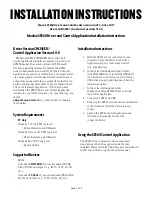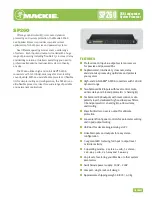
Functional Description
24.3.2.3 Master Transmit and Receive Mode
This mode is programmable per channel (bit TRM of register MCSPI_CH(I)CONF).
The channel access to the shift registers, for transmission/reception, is based on its transmitter and
receiver register state and round robin arbitration.
The channel that meets the rules below is included in the round robin list of already active channels
scheduled for transmission and/or reception. The arbiter skips the channel that does not meet the rules
and search for the next following enabled channel, in rotation.
Rule 1: Only enabled channels (bit EN of the register MCSPI_CH(I)CTRL), can be scheduled for
transmission and/or reception.
Rule 2: An enabled channel can be scheduled if its transmitter register is not empty (bit TXS of the
register MCSPI_CH(I)STAT) or its FIFO is not empty when the buffer is used for the corresponding
channel (bit FFE of the register MCSPI_CH(I)STAT) at the time of shift register assignment. If the
transmitter register or FIFO is empty, at the time of shift register assignment, the event TX_underflow is
activated and the next enabled channel with new data to transmit is scheduled. (See also transmit only
mode).
Rule 3: An enabled channel can be scheduled if its receive register is not full (bit RXS of the register
MCSPI_CH(I)STAT)) or its FIFO is not full when the buffer is used for the corresponding channel (bit FFF
of the register MCSPI_CH(I)STAT) at the time of shift register assignment. (See also receive only mode).
Therefore the receiver register of FIFO cannot be overwritten. The RX_overflow bit, in the
MCSPI_IRQSTATUS register is never set in this mode.
On completion of SPI word transfer (bit EOT of the register MCSPI_CH(I)STAT is set) the updated
transmitter register for the next scheduled channel is loaded into the shift register. This bit is meaningless
when using the Buffer for this channel. The serialization (transmit and receive) starts according to the
channel communication configuration. On serialization completion the received data is transferred to the
channel receive register.
The built-in FIFO is available in this mode and if configured in one data direction, transmit or receive, then
the FIFO is seen as a unique 64-byte buffer. If configured in both data directions, transmit and receive,
then the FIFO is split into two separate 32-byte buffers with their own address space management. In this
last case, the definition of AEL and AFL levels is based on 32 bytes and is under CPU responsibility.
24.3.2.4 Master Transmit-Only Mode
This mode eliminates the need for the CPU to read the receiver register (minimizing data movement)
when only transmission is meaningful.
The master transmit only mode is programmable per channel (bits TRM of the register
MCSPI_CH(I)CONF).
In master transmit only mode, transmission starts after data is loaded into the transmitter register.
Rule 1 and Rule 2, defined above, are applicable in this mode.
Rule 3, defined above, is not applicable: In master transmit only mode, the receiver register or FIFO state
“full” does not prevent transmission, and the receiver register is always overwritten with the new SPI word.
This event in the receiver register is not significant when only transmission is meaningful. So, the
RX_overflow bit, in the MCSPI_IRQSTATUS register is never set in this mode.
The McSPI module automatically disables the RX_full interrupt status. The corresponding interrupt request
and DMA Read request are not generated in master transmit only mode.
The status of the serialization completion is given by the bit EOT of the register MCSPI_CH(I)STAT. This
bit is meaningless when using the Buffer for this channel.
The built-in FIFO is available in this mode and can be configured with FFEW bit field in the
MCSPI_CH(I)CONF register, then the FIFO is seen as a unique 64-byte buffer.
4006
Multichannel Serial Port Interface (McSPI)
SPRUH73H – October 2011 – Revised April 2013
Copyright © 2011–2013, Texas Instruments Incorporated















































